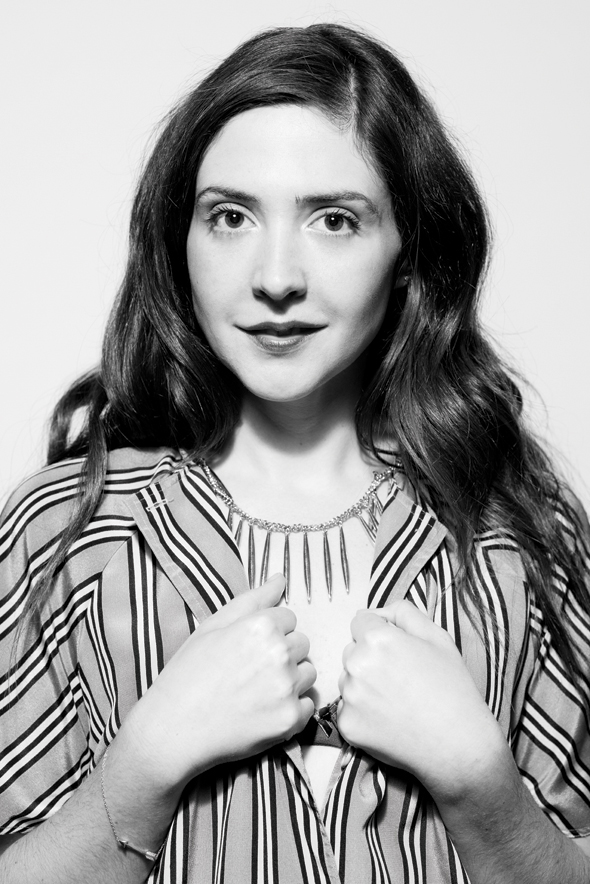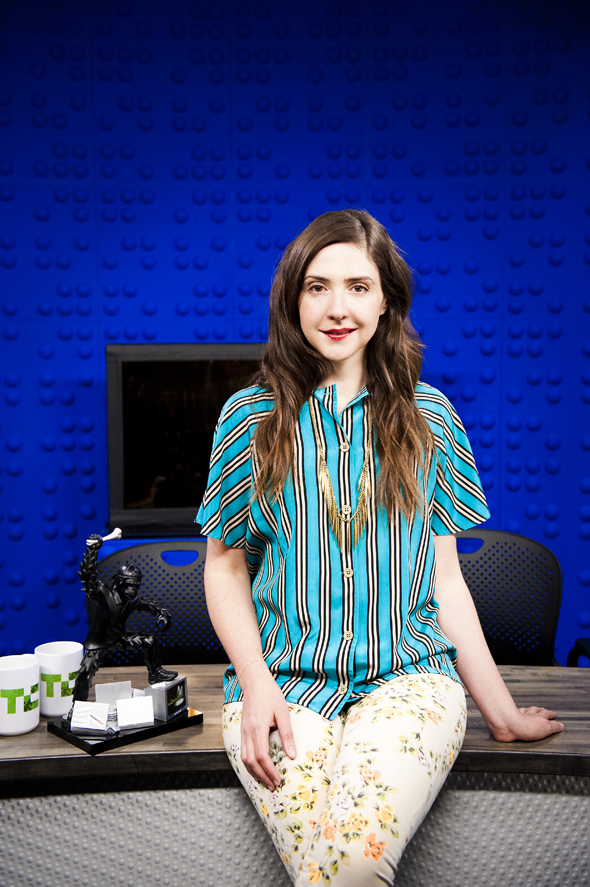“Tech is sort of a 21st century art,” muses TechCrunch co-editor Alexia Tsotsis as she takes the conversation meta, because that’s what she does. Constantly cross-referencing ideas while making new insights that seem to bubble out of her as she goes, her enthusiasm for technology is contagious. Clearly an analytical thinker, Alexia’s quick-witted levity is right there too, shadowing her intellect and peeking out when you least expect it.
The idea of making a living by writing about your passion sounds too good to be true. Now imagine a job unfettered by dogmatic editors or arbitrary rules. Go further. Take the pesky journalistic principle of “objectivity” and chuck it. Next, add in some humor, a little sass, and extremely high visibility. Now what do you have? Alexia Tsotsis’ dream job.
Co-editor of TechCrunch, a prominent web publication that offers breaking news, analysis, and unfiltered opinion on the tech industry, Alexia is in her element and it shows. Equal parts warm, calm, and astute, she possesses a graceful and unassuming authority that makes you want to lean in and listen to what she’s about to say. And people do. With over 165,000 Facebook followers, Alexia is a major influencer. Named one of Forbes “30 under 30: Media in 2011” she is ranked among the greatest and most innovative young minds in the business.
So how did Alexia Tsotsis manage to land her dream job at such a young age? It was not an easy or formulaic trajectory. Even as a youngster, Alexia was not one to compromise her creative vision. She remembers back to her physically awkward seven-year-old self who dreamed of being an actress. Despite giving her all at auditions, she kept getting cast as inanimate objects like a tree or a rock. Clearly this isn’t working, she thought. Time to reassess.
“Well, writing’s sort of like acting…but quiet,” she rationalized, “and you have more control because there’s no one there telling you that you have to be a rock!” She laughs at the simplicity of the solution. With writing, young Alexia figured, she could be whoever she wanted to be.
With this in mind, Alexia decided she needed to go to Stanford University because “that’s where the smart kids go.” She wrote a creative, risky, and “very strange” essay about a month spent at a nudist colony and sent it in with her application. She did not get in. She did, however, get accepted to USC with a full scholarship where she double-majored in Art and Creative Writing. This offered her the chance to completely indulge her unique voice and inquisitive, creative nature.
After college, Alexia didn’t know what to do. “Off to New York!” she decided, again to where the smart people go. After a series of disappointments, rejections, and dead-end jobs, she began to gain some traction with administrative positions for art dealer Jeffrey Deicht and Elite Model Management. Though she was finally able to afford a bedroom with a door, she was not passionate about her work.
She did, however, receive some of the best advice during her New York adventures. Known for her cool-under-pressure demeanor, one of the top agents at Elite once asked her, “Alexia, will you teach me how to keep calm?”
“Sure,” she replied, “if you teach me how to gain power.” The agent simply told her, “You just stick around longer than anyone else.” Alexia regards this as some of the best advice anyone has ever given her. It would end up helping her down the road.
It was only after her return home from New York that Alexia started writing professionally. It was during the aftermath of the 2008 economic crash that Alexia felt she hit rock bottom: she was 26 and heartbroken from an engagement that didn’t work out. Through the help of a friend, she got an opportunity to cover an event for LA Weekly. The gig became more regular and after demonstrating a knack for driving traffic, Alexia was promoted to web assistant. Soon after she became the web editor of SF Weekly.
As a tech events writer, Alexia always had SF Weekly open in one tab, and TechCrunch in another. She religiously covered everything TechCrunch did, and even hung their poster on her cubical wall. She saw the site as her escape from the more traditional world of journalism in which she was immersed. She delighted in its positivity and enjoyed reading articles by writers who were so clearly passionate about what the Internet has done for human communication.
I don’t think humans can be objective. It’s impossible. People say to me, ‘you’re not objective,’ and I say, ‘yeah I know.’
Alexia had no idea that an odd twist of fate was on the horizon. While covering a conference attended by Mark Zuckerberg, Alexia noticed an odd, cultish-looking Facebook symbol on his hoodie. Someone asked about it, but he just shrugged it off. Her curiosity was piqued and she whipped out her iPhone to take some shots. She even wrote Facebook PR to see if they could explain it. Not satisfied with their vague answers, Alexia convinced an artist at SF Weekly to help her make a recreation of the emblem so she could write a fun, investigative post.
Alexia posted the artist’s recreation along with her two-page analysis on SF Weekly’s website. Light-hearted but clever, the post went viral, creating a ton of speculation. Before she knew it, Alexia was the Internet sensation du jour. Job offers poured in from everyone. Everyone except Michael Arrington at TechCrunch!
At a party, Alexia approached him and said, “You know, I really want to work for you. I think I have a lot to learn.” He knew who she was since she’d covered virtually every TechCrunch event up to that point. “Of course, I love you,” he said casually. Floored, Alexia was one step closer. She joined TechCrunch in August 2010 and by September they had sold the company to AOL. She thought back to the advice she received in New York from her former boss about how to gain power by sticking around. When it seemed like everyone was jumping ship, she held tight.
Two years later, Alexia’s colleague, Eric Eldon, was offered the position of editor after Alexia had recommended him. “Eldon should be knighted,” she jokes while explaining how it all came to be. Right after Eldon accepted the job, he asked Alexia to join him. Now the two of them are running the TechCrunch blog. Their symbiotic relationship can be summed up by this brief email exchange: Eldon writes, “I like data analysis, but it always needs a little mysticism.” She retorts, Alexia-style: “Well, I like mysticism, but it always needs a little data analysis.”
Text by Michelle Oznowicz
Photography by Liz Caruana



